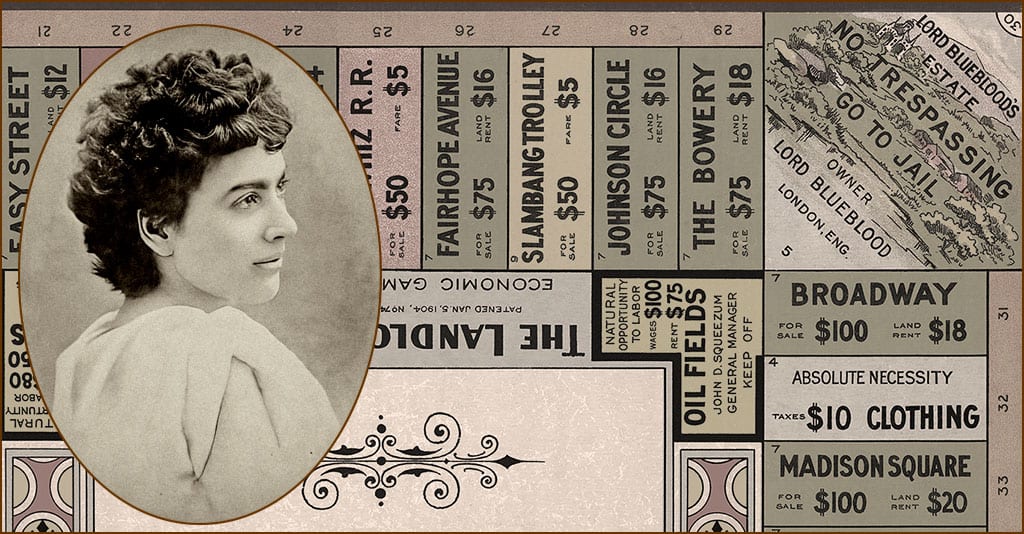
You know the rules. Landlords get rich at the expense of tenants. Travel means shelling out for a railroad ticket. You can have utilities, but they’ll cost you. Run afoul of the landlord and go directly to jail — forget about passing GO and collecting $200. It’s the board game Monopoly, invented by a feisty, progressive feminist whose invention was stolen in the 1930s by a man named Charles Darrow.
Parker Brothers, in marketing Monopoly, made Darrow, a down-on-his-luck salesman struggling to support his family in the Depression, a folk hero, claiming, “It was the game’s exciting promise of fame and fortune that initially prompted Darrow to produce this game on his own.” Except he didn’t.
Monopoly’s Progressive Roots
Elizabeth Magie was born into a progressive Illinois family in 1866. Her father was a newspaper publisher and abolitionist who stumped for Lincoln as he traveled Illinois in the late 1850s for the Lincoln-Douglas debates.
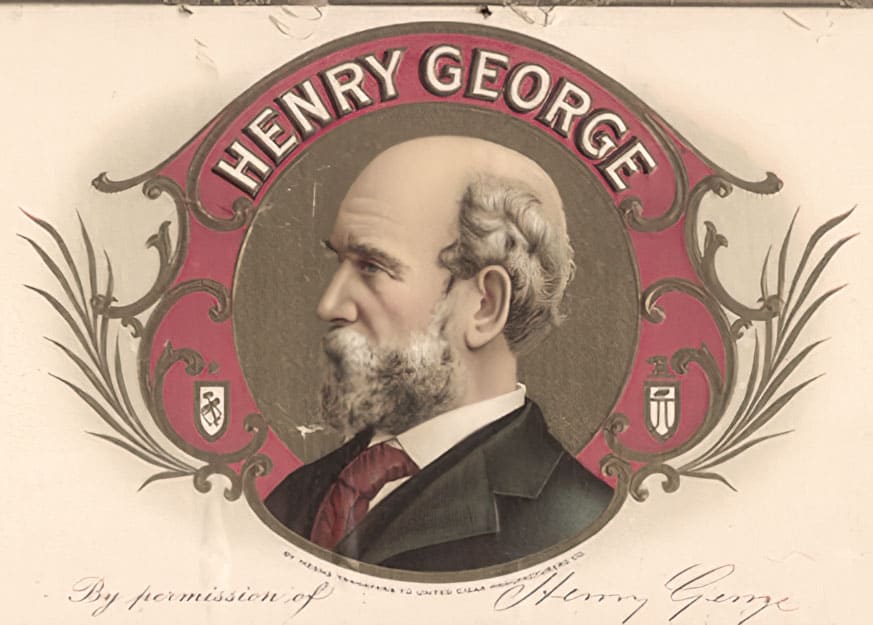
The seeds for Monopoly took root when Magie introduced his daughter to the theories of economist Henry George, whose book, Progress and Poverty, was so popular it outsold every book except the Bible in the 1890s. He believed individuals should own what they made or created, but that land should belong to everyone. He championed a single land tax to shift the tax burden to wealthy landlords. The tax revenues would then be invested in public and social services to encourage landowners to use their land for the greater good. Embracing George’s philosophy, Magie took it upon herself to spread the gospel of Henry George.
Not a Woman of Her Time
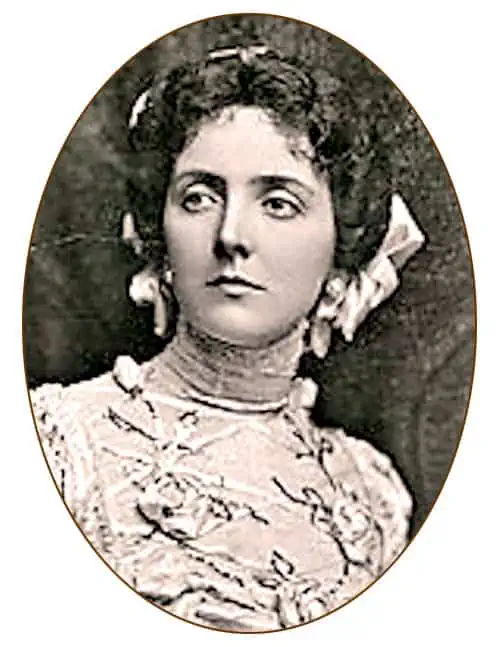
If there’s one thing to be said about Elizabeth Magie, it’s that she was “not a woman of her time.” She had pale skin and striking brows, a strong jawline and an even stronger work ethic.
She was a spinster who supported herself as a stenographer and, later, a newspaper reporter. Head of her own household, she had saved enough to buy her own home on several acres in Washington, DC — a home she shared with a male actor who paid rent and a Black female servant. She didn’t marry until what was then considered the advanced age of 44, when she wed businessman Albert Phillips, 10 years her senior.
A Stifled Stenographer
She put her strong work ethic to work as a stenographer and typist in Washington’s Dead Letter Office, researching and locating intended recipients and redirecting America’s undeliverable mail and packages.
While it was a respectable position for a woman, Magie struggled to find an outlet for her creativity. She wrote poetry, and wrote and performed comedy routines in Washington’s budding theater scene. But most of her off time was spent drawing, rethinking and tweaking a board game she invented to teach and promote George’s economic theory to a wider audience. At the turn of the 20th century, the increasing popularity of board games provided that outlet.
The Landlord’s Game
Magie called her game The Landlord’s Game. She was in her 30s when she applied for and was granted a patent ( #748,626) for The Landlord’s Game, becoming one of the fewer than 1% of female patent applicants at the time.
In 1903, a single woman marching herself into the Patent Office was a pretty brazen act. After all, it would be 17 more years before women got the right to vote. And despite innovations like the typewriter and telephone giving women new career opportunities, society still saw them as having little to contribute to the world of ideas. Putting it bluntly, as one newspaper wrote in 1912, “they don’t use their brains as much as men.”
Rules of the Game
Magie designed her Landlord’s Game to demonstrate the evils of land grabs and monopolies along with their consequences. Players used fake money to buy and sell deeds and properties, borrowed from the bank, and paid taxes. They circled a clearly-drawn path, one corner anchored by the Poor House and Public Park. Across the board was the Jail. Another corner showed a globe with an homage to Magie’s idol, Henry George: “Labor Upon Mother Earth Produces Wages.” And included on her original board patented in 1903 were the immortal words that have endured for over a century since Elizabeth Magie wrote them: “GO TO JAIL.”
Players circled the board, performing labor and earning wages. Each time they passed the Mother Earth space they were supposed to have performed so much work they received $100 in play money wages. Players who ran out of money were sent to the Poor House. And trespassing on someone’s land earned you a trip to Jail, where you sat until you either threw a double or paid a $50 fine.
Two Sections: Prosperity and Monopoly
Magie included two sets of rules for her game. One set was called Prosperity, in which everyone who played well prospered, the winner being whoever had prospered the most. The other was Monopoly, in which the strongest player bankrupted and crushed weaker players by creating monopolies. Designed as a teaching tool, Magie clearly meant to show how the first set of rules was morally superior. But, naturally, human nature kicked in and everyone wanted to play by the take-no-prisoners Monopoly rules.
The Landlord’s Game was published by the Economic Game Company, of which Magie was a part, in 1906.
Atlantic City Quakers
The game took off, becoming a favorite of progressive intellectuals and college students, especially in the Northeast, where it was played at the Wharton School of Finance and Economy, Harvard University and Columbia University.
A group of Quakers who had established a community in Atlantic City discovered the game and amended it, adding local street and neighborhood names to the board. Anyone who has ever driven the area around what was once dubbed “America’s Playground” and played Monopoly will recognize Baltic Avenue; St. Charles Place; Marvin Gardens; the Boardwalk and Park Place. It was this version of Magie’s game a man named Charles Darrow learned to play.
Meanwhile, Magie had filed for and was awarded a new patent (#1,509,312) for The Landlord’s Game when her original patent expired in 1921.
Intellectual Property Theft or Freak of Invention?
Philadelphia businessman Charles Darrow was introduced to a popular new board game by friends in 1932. They met as students of the Quaker Westtown School in the early 1900s; it was the connection between the Westtown School and Atlantic City Friends’ School that led the Atlantic City Quakers to discover Magie’s game.
Darrow asked for the rules of the game, but his friends were confused since they hadn’t written down any rules, not even knowing if any existed. They did — Elizabeth Magie had painstakingly written them in 1903. But that didn’t phase Darrow, who amended the rules and begin distributing his own game he called Monopoly, the heart of which was Magie’s Landlord’s Game.
In 1935, Patent #2,026,082 was granted to Charles Darrow for Monopoly. He had pitched his game to New England board game publishers Parker Brothers a year earlier, but was rejected. A year later, after Darrow had sold 5,000 homemade copies of his game, Parker Brothers, which was nearly put out of business by the Great Depression, took notice and bought Darrow’s rights to Monopoly. That purchase supposedly saved Parker Brothers, which sold hundreds of millions of copies of the game worldwide.
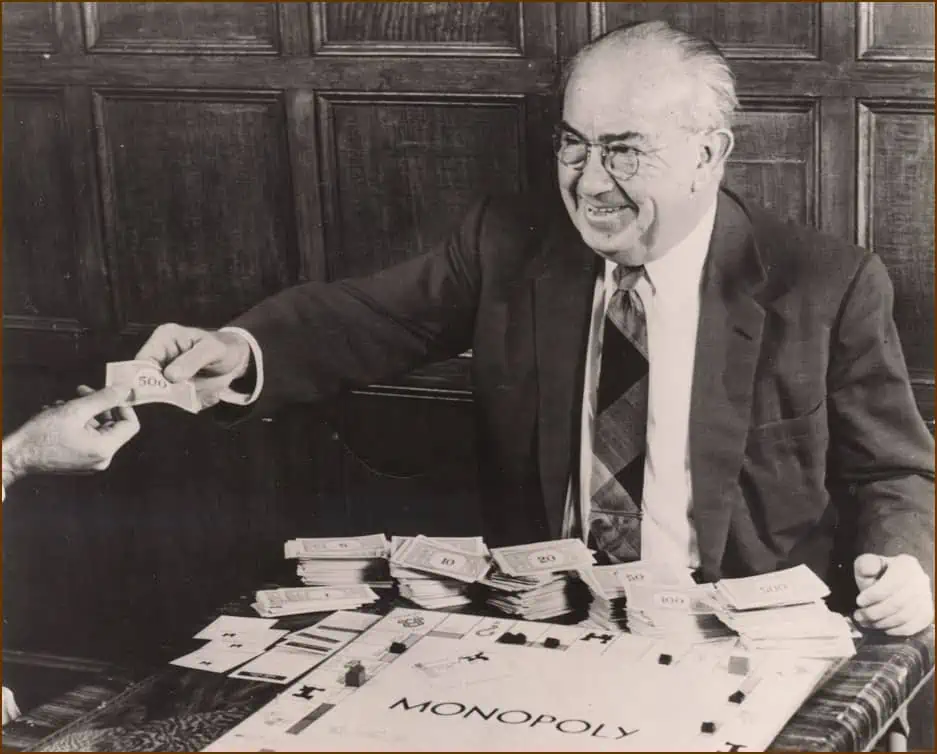
As for Darrow, his version of the game he sold to Parker Brothers became a phenomenal success, made him millions, and guaranteed him royalties for the rest of his life. When a reporter from the Germantown Bulletin asked how a down-on-his-luck, laid-off heater salesman managed to invent Monopoly out of thin air, Darrow replied, “It’s a freak. Entirely unexpected and illogical.”
Bamboozled by Parker Brothers
Shortly after buying the rights to Monopoly, Parker Brothers suspected Darrow wasn’t the only inventor of the game. In an effort to seize control of Monopoly and other board games and create its own real-life monopoly, the company struck a deal with Elizabeth Magie. For her patent rights to The Landlord’s Game and two other game ideas, she received a measly $500 — and no royalties.
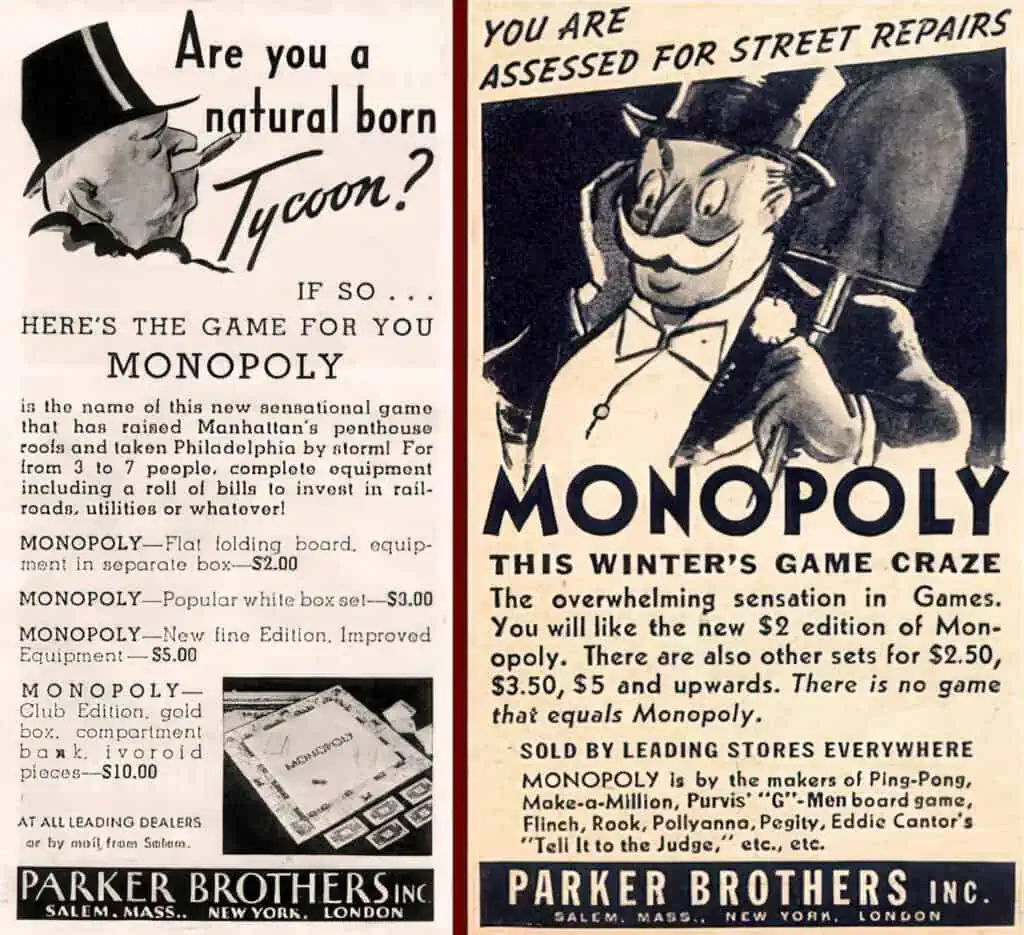
Parker Brothers began marketing Monopoly in 1935, using the inspiring story of struggling salesman Charles Darrow toiling to create the game in his basement to support his family during the Depression. Neither Darrow nor Parker Brothers ever mentioned Elizabeth Magie or The Landlord’s Game. It was as though both the original inventor and her work were simply erased from history.
The True Inventor
A year later, Washington’s The Evening Star ran a feature about local inventor Elizabeth Magie of Clarendon, VA, noting uncanny similarities between Darrow’s Monopoly and The Landlord’s Game.
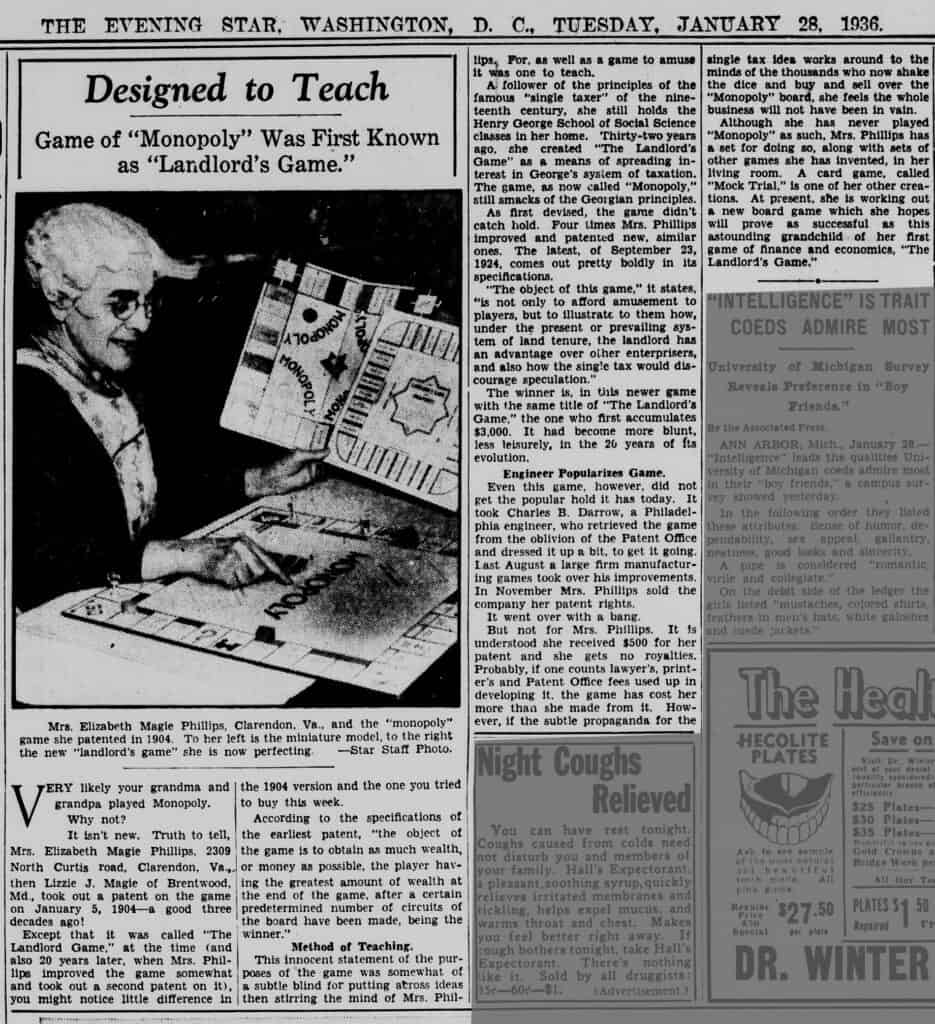
At 70 years old, her white hair pulled into a bun, Magie began giving interviews to The Washington Post and The Evening Star, railing at Darrow for stealing her idea. To prove she was the true inventor, she held her original game board before the press photographer’s camera alongside another, slicker game board with the word MONOPOLY writ large across the center.
The Evening Star reported that when one considered what Magie had spent on lawyers fees, printing and the Patent Office fees required to develop her invention, her game “cost her more than she made from it.”
A Woman Erased from History
Elizabeth Magie died in obscurity in 1948 at 81 and was buried next to her husband, Albert Phillips, in Columbia Gardens Cemetery in Arlington, VA. Neither her headstone nor her obituary at the time mentioned her role in creating one of the world’s most popular board games. One of her last jobs was at the U.S. Office of Education, where co-workers knew her only as an elderly typist who talked about inventing games.
“The Monopoly Lie”
It wasn’t until 1973, 25 years after her death, that Elizabeth Magie’s role as Monopoly’s real inventor was uncovered by economics professor Ralph Anspach. Anspach was under attack by Parker Brothers for his creation of what he called the Anti-Monopoly game. When research for his court case uncovered Magie’s patents and the game’s true roots, he made it his mission to expose what he called “the Monopoly lie.”
When the president of Parker Brothers was deposed, he called Magie’s original game “completely worthless,” claiming his company had published a small run of her Landlord’s Game “merely to make her happy.” As for Anspach, he took his case against Parker Brothers to the Supreme Court, winning the right to produce his Anti-Monopoly games.
Now, a 2015 best-selling book by award-winning journalist Mary Pilon gives Elizabeth Magie her due once and for all. The Monopolists: Obsession, Fury and the Scandal behind the World’s Favorite Board Game is described as “a fascinating social history of corporate greed…that reads like the best detective fiction, told through Monopoly’s real-life winners and losers.”
“Greed is Good”
Today, Hasbro, headquartered in Rhode Island, owns Parker Brothers. It has determinedly downplayed Magie’s contributions to the world of board games, responding to all queries with this terse statement: “Hasbro credits the official Monopoly game produced and played today to Charles Darrow.” Their website even features a Monopoly history timeline pegging its origin to 1935.
So the Darrow myth and Anspach’s “Monopoly lie” live on. Seems only fitting in the context of a game that became all about crushing your opponents and winning at all costs and the words of Gordon Gekko in the movie Wall Street come to mind: “Greed is good.”
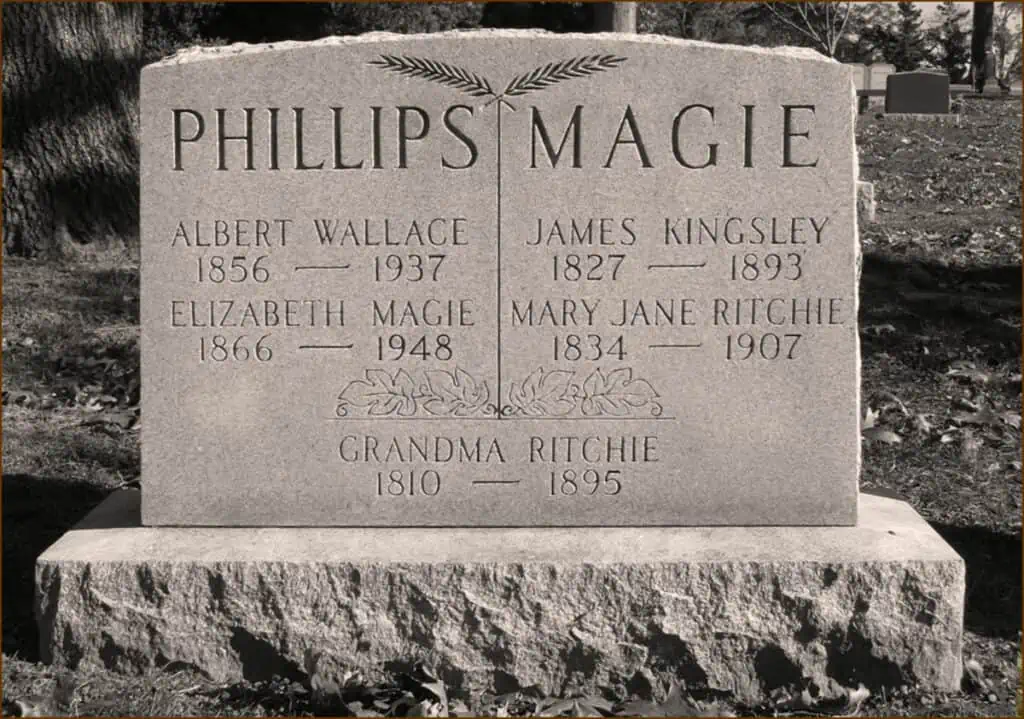



What an interesting story and who really invented the monopoly game. Women are just as smart and men but men don’t think that way. Women have come a long way since then and will continue as life progresses. I will share this information so they will know the true facts.
I heard the story as a kid about Elizabeth Phillips.
Alva Lee Phillips aka Chris Harris – chrisharrispr.com
Until today, I believed the Monopoly Lie, that Darrow was the game’s inventor. My husband and I were participating in a trivia game where one category was four famous items invented by women. One of the items was “a board game that teaches players about a single tax system.” I was certain the answer could not be Monopoly, resolute in my knowledge that the game was invented by a man. I was shocked to learn the truth, which led me to this most excellent article. Yet again, sadly, a woman was forced into obscurity by male domination and greed. I hope more attention is paid to this trailblazer. I can only imagine what a delight it must have been to know her.
I am saddened by the responses of rage at how Elizabeth was robbed of her just due rewards for creating Monopoly. I am more sick of the things Elizabeth was denied than you can imagine. Effort is the only thing that beats failure. Use monopoly to build and teach all the millions of Little Elizabeth’s waiting to be freed, taught and exposed into the world. Don’t get mad. Get Even. Never let Elizabeth be forgotten.
I second what Jean Morris wrote.
What an inspiring life she led for someone like me to contemplate.
Thank you for this well-laid abridgment of Elizabeth Magie’s contributions to the world I live in.
I will never buy another monopoly game, or any hasbro games, or any games they are affiliated with.